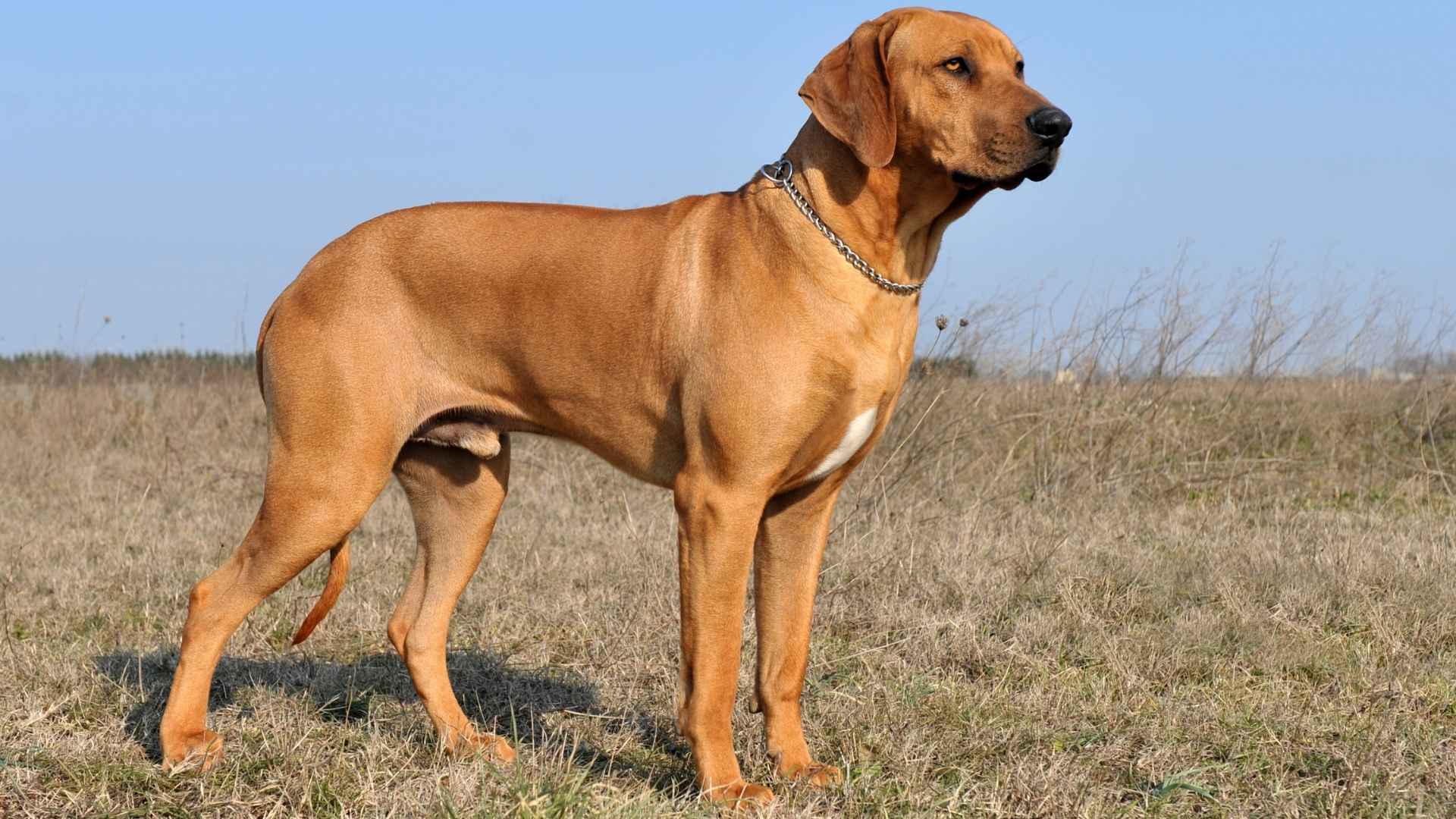Choosing the right guard dog for your home isn’t just about protection; it’s about finding a loyal companion who will blend seamlessly into family life. The best family guard dogs strike a rare balance: they’re strong and alert enough to deter intruders, yet gentle and affectionate with the people they love.
From playful giants who adore children to highly intelligent protectors who form unbreakable bonds, these dogs prove that safety and companionship can go hand in hand. Families across the world favor certain breeds not only for their natural guarding instincts, but also for their adaptability, trainability, and loyalty.
Whether you’re looking for a furry playmate who doubles as a watchful protector, or a calm, confident guardian who thrives in a busy household, the right breed can make all the difference.
Below, we explore ten popular guard dog breeds that are celebrated for their ability to keep families safe, while filling homes with love and joy.
Popular Guard Dog Breeds That Are Loved By Families
1. German Shepherd
German Shepherds are renowned for their intelligence and versatility, which makes them one of the most popular guard dogs for families. They are quick learners with exceptional problem-solving skills, which is why they are often used in police and military work. At home, this intelligence translates into a loyal companion that is highly responsive to training.
One of their strongest traits is confidence. AKC states that German Shepherds are naturally protective without being needlessly aggressive, which makes them dependable guardians in a family environment. With consistent training, they can distinguish between real threats and normal daily activity.
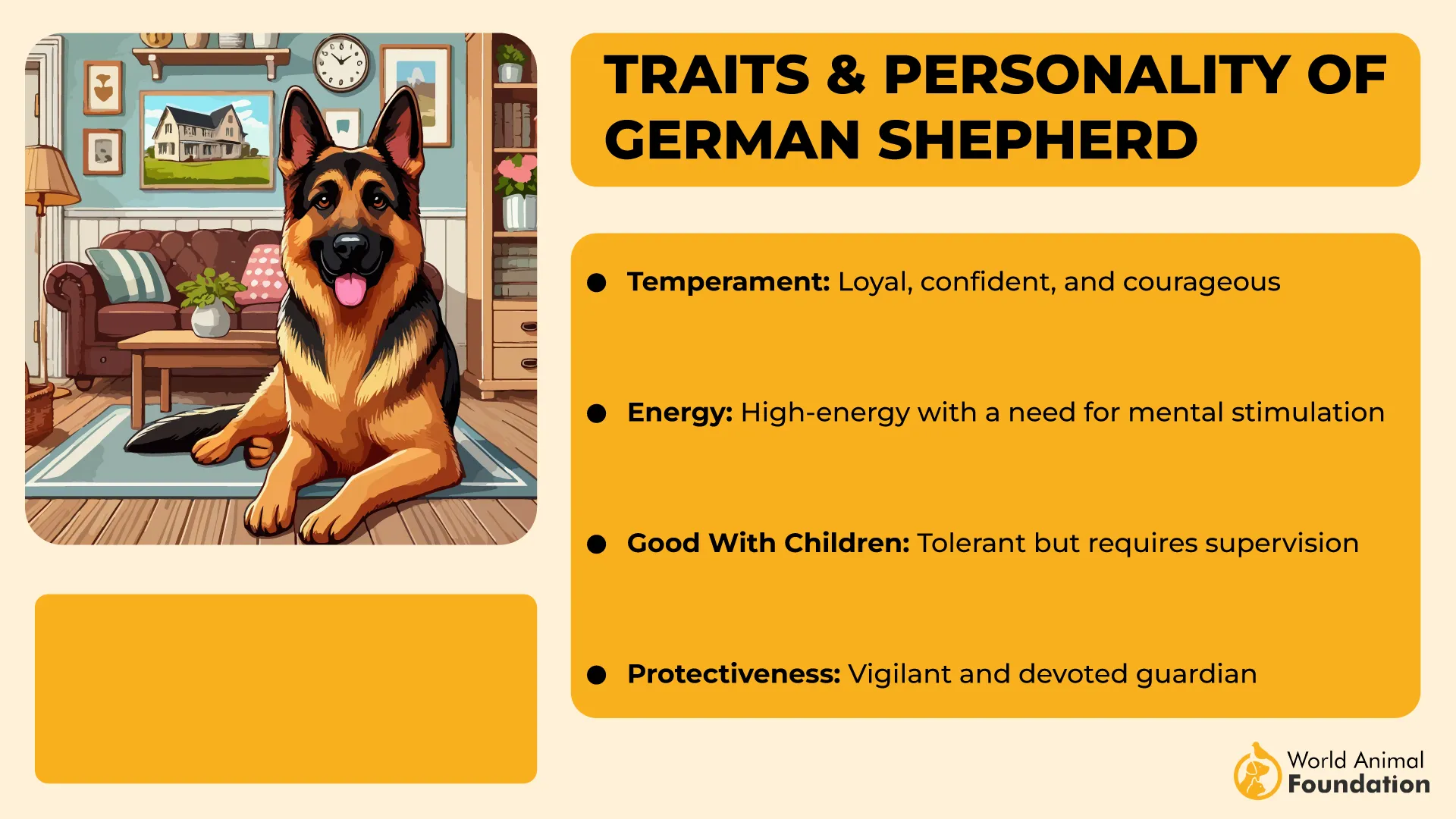
German Shepherds also thrive on companionship. They bond deeply with family members and enjoy participating in household routines. This affectionate side balances their guarding instinct, making them reliable around children when properly socialized.
Physically, they are powerful dogs with athletic builds. Their stamina allows them to patrol and protect with ease, while their agility makes them excellent at obedience, agility, and protection sports. Families that can provide space for exercise will find their energy well-suited to an active lifestyle.
As family guard dogs, their alertness is unmatched. They are naturally watchful, always aware of their surroundings, and quick to signal anything unusual. This makes them both protective companions and loyal family members.
Quick Tips
Begin training early to channel their intelligence into positive behaviors.
Provide daily mental and physical stimulation to prevent restlessness.
2. Rottweiler
Rottweilers are powerful, confident dogs known for their natural guarding instincts. Their calm yet courageous demeanor makes them highly dependable when it comes to protecting loved ones. With proper training, they become steady companions who balance strength with affection.
They are also incredibly loyal. Rottweilers form strong attachments to their families, showing both protectiveness and tenderness in the home. This combination of devotion and vigilance is what makes them a favorite among family guard dog breeds.
Despite their imposing appearance, Rottweilers are not inherently aggressive. Instead, they are watchful and calculated, often assessing situations before reacting. This measured temperament is part of what makes them excellent guardians rather than reckless protectors.
Physically, they are muscular and athletic, built to handle demanding tasks. Their endurance makes them suitable for families that enjoy outdoor activities, as they thrive with exercise and purposeful work. Mental stimulation is just as important, as Rottweilers are highly intelligent.
Rottweilers also shine as companions when socialized early. They are affectionate toward children and can adapt to a lively household if given guidance and clear boundaries. This dual role of affectionate family member and fearless protector is why many families trust them as guard dogs.
Quick Tips
Establish consistent leadership and training from puppyhood.
Provide both physical exercise and problem-solving activities to keep them balanced.
3. Doberman Pinscher
Doberman Pinschers are sleek, athletic dogs known for their speed and alertness. Originally bred for protection, they possess a strong instinct to guard while remaining deeply loyal to their families. Their combination of elegance and strength makes them stand out as both protectors and companions.
A hallmark of the breed is its intelligence. Dobermans are fast learners, capable of mastering advanced obedience and protection training. This sharpness ensures they can adapt quickly to family routines and expectations.
They are also affectionate dogs that thrive on human interaction. According to the Doberman Planet, Dobermans bond closely with their owners, often preferring to stay close to them and acting as loyal “shadows” throughout the day. This makes them excellent family dogs when given proper attention.
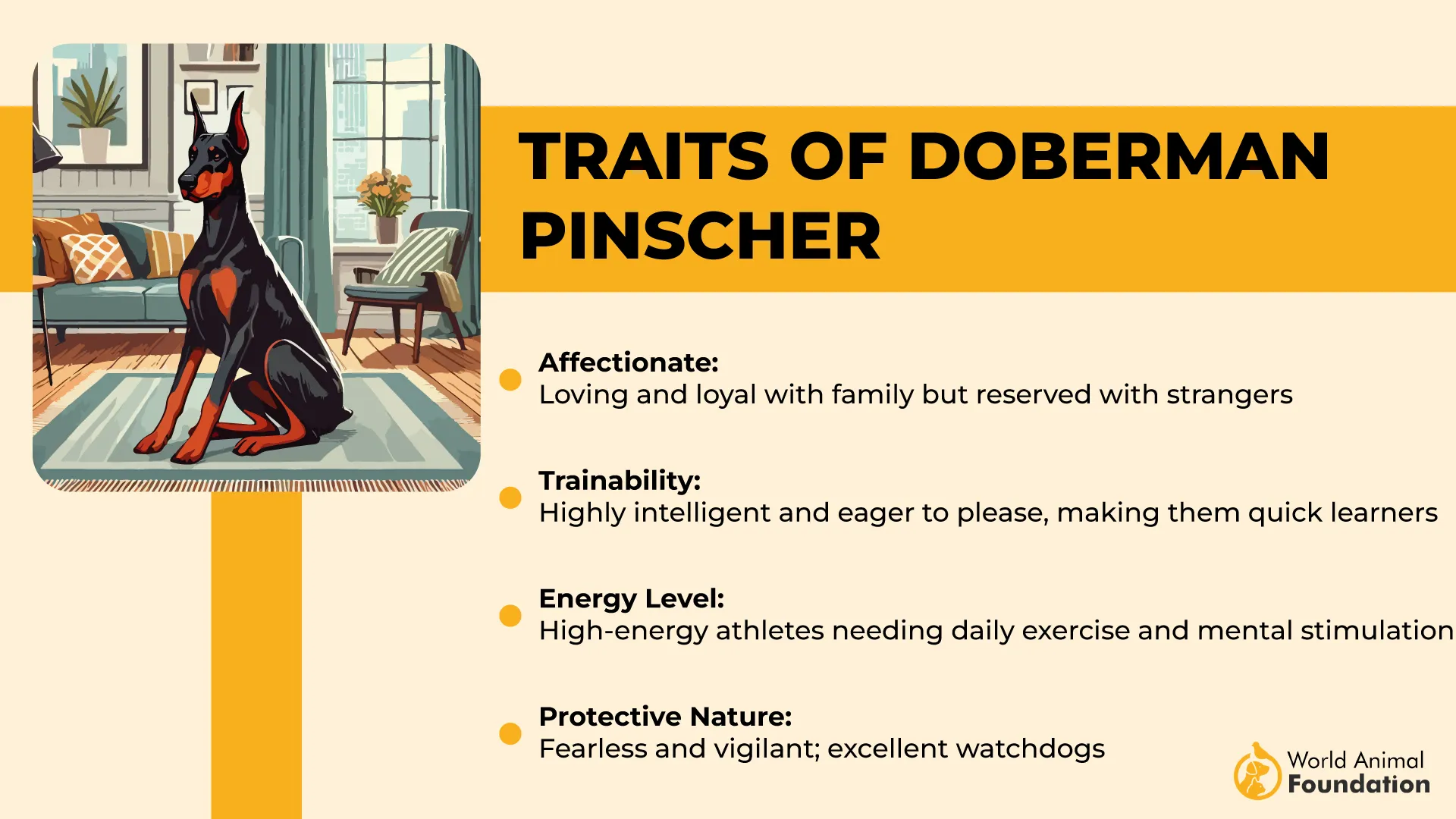
Their athleticism is another defining trait. With powerful builds and high energy levels, Dobermans require daily exercise and enjoy activities such as running, agility training, or structured play. Families who can match their stamina will find them highly rewarding.
As family guard dogs, their fearless nature shines. They are naturally protective but also discerning, which allows them to respond appropriately to genuine threats while remaining calm with familiar people.
Quick Tips
Provide structured daily exercise to match their high energy needs.
Begin early socialization to encourage well-rounded behavior.
4. Boxer
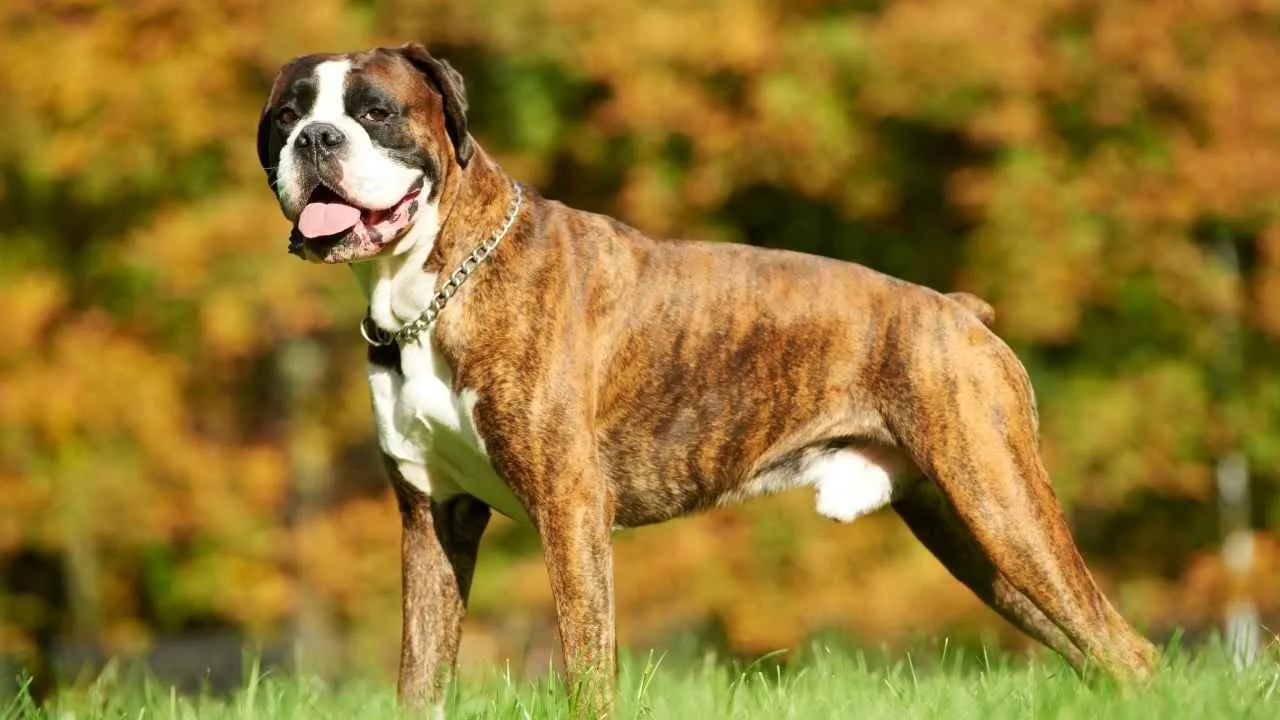
Boxers are energetic and fun-loving dogs that double as reliable protectors. Known for their playful personalities, they bring joy to family life while also being naturally alert and watchful. This duality makes them especially appealing as family guard dogs.
One of their strongest traits is loyalty. Boxers develop close bonds with their families and are known for their affectionate nature toward children. This makes them not only protective but also gentle and loving companions.
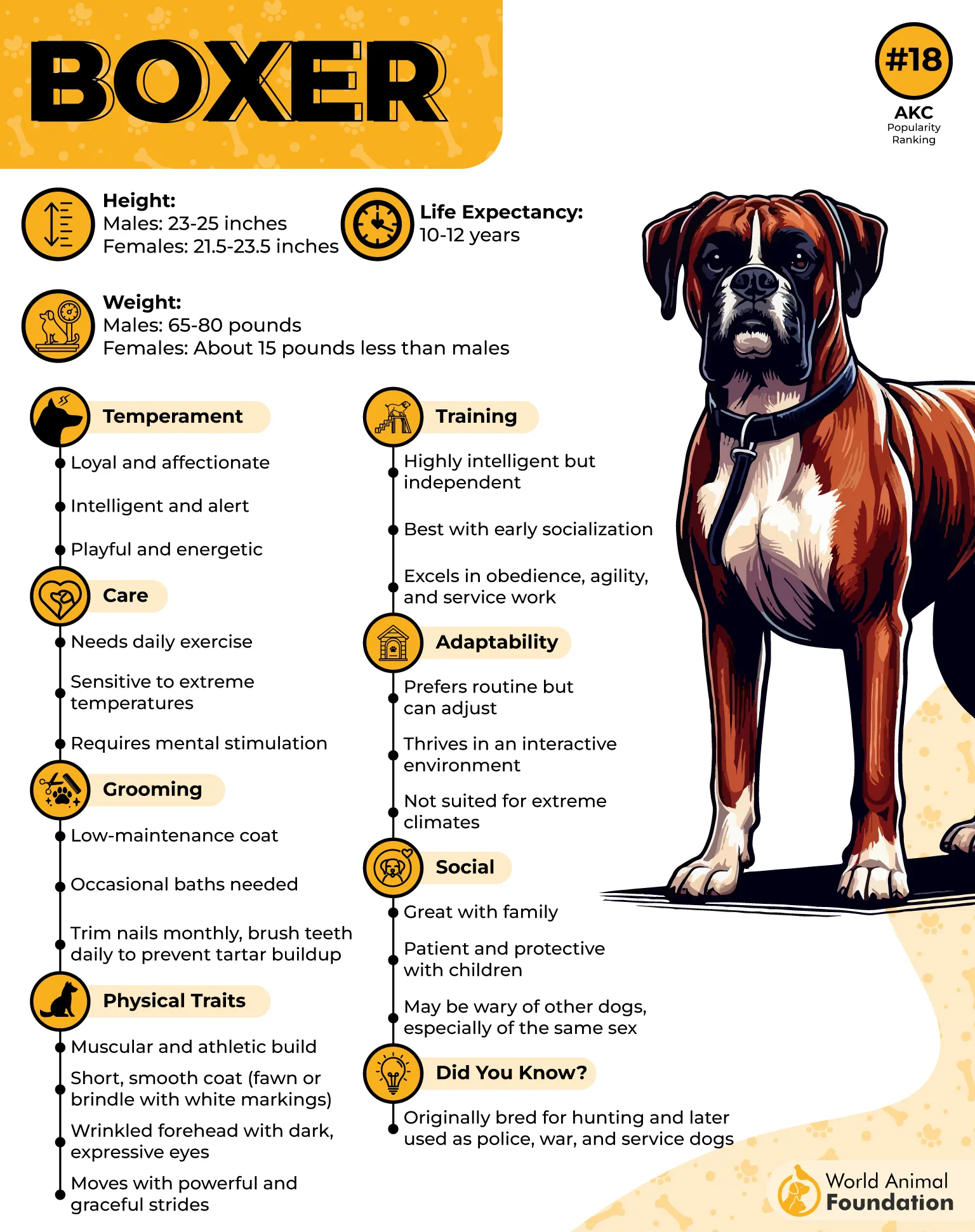
Despite their clownish charm, Boxers are highly intelligent and respond well to consistent training. They enjoy mental challenges and are eager to please, which makes them adaptable to structured routines. Their intelligence also supports their role as dependable guardians.
Physically, Boxers are athletic and strong. Their muscular builds and high stamina allow them to thrive in active households that can provide regular exercise. They excel in outdoor activities and benefit from having both physical and mental outlets.
When it comes to protection, Boxers are naturally alert. They are quick to notice unfamiliar activity and can be courageous when needed, making them excellent watchdogs that remain affectionate within the family.
Quick Tips
Incorporate plenty of playtime to keep their active minds and bodies engaged.
Use positive reinforcement training to shape their eager-to-please attitude.
5. Bullmastiff
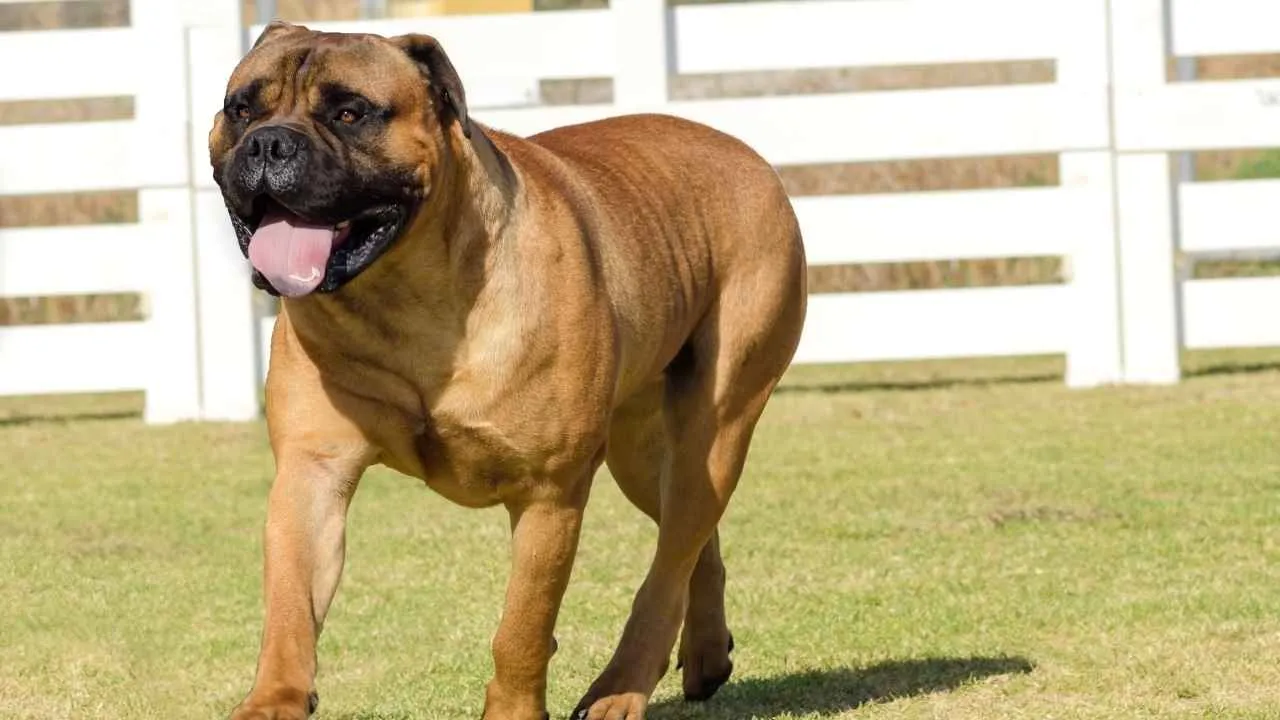
The Bullmastiff was first developed in England during the 19th century as the “Gamekeeper’s Night Dog.” By combining the speed of the Bulldog with the size and strength of the Mastiff, breeders created a quiet but powerful guardian capable of restraining intruders without unnecessary aggression.
Despite their formidable build, Bullmastiffs are famously calm and gentle at home. They are known for being quiet dogs that rarely bark unless necessary. According to The Mastiff Guide, their loyalty is unwavering—they see their human family as their “pack” and are devoted protectors, though they may be cautious with unfamiliar people
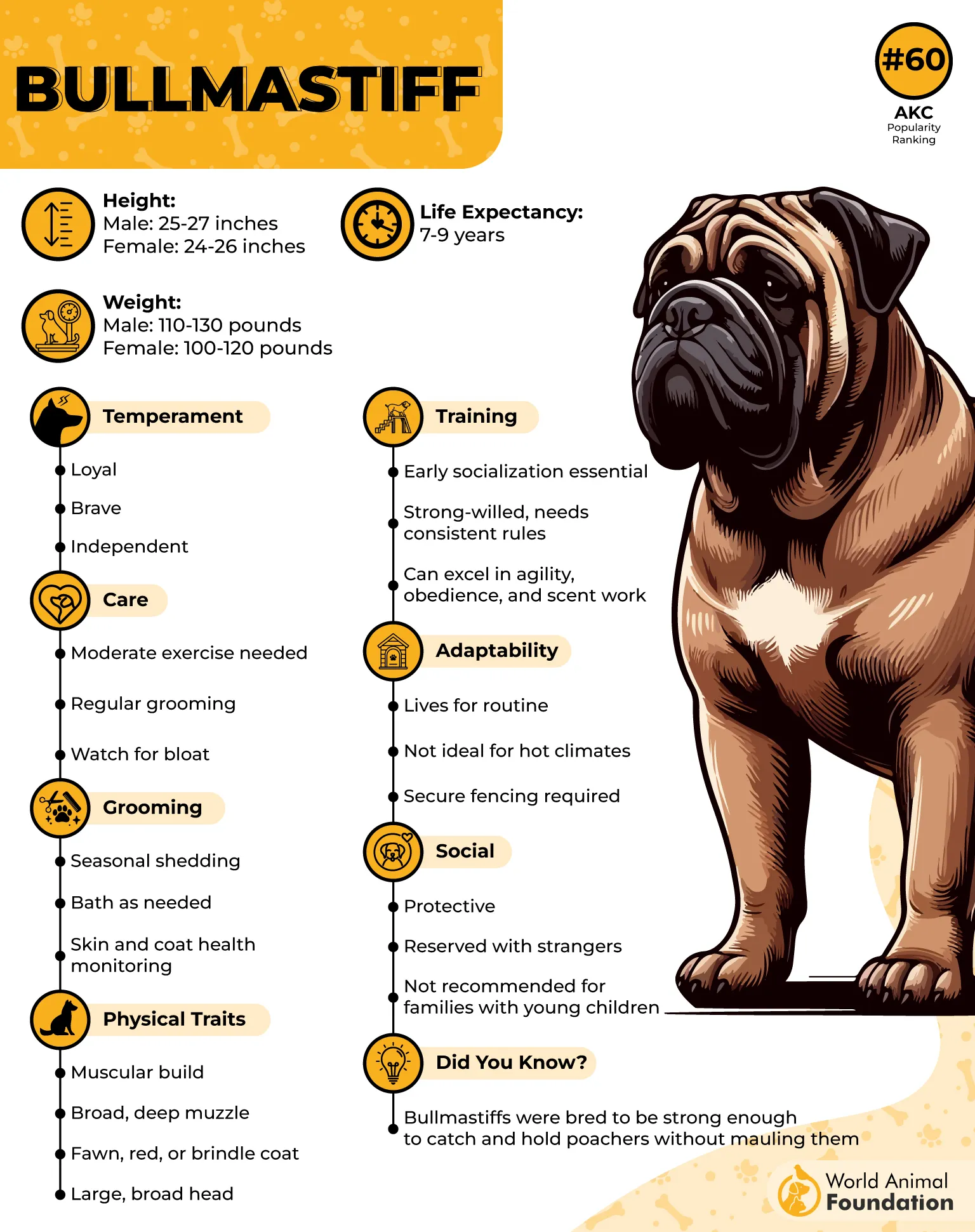
With moderate energy levels, these dogs do not require endless exercise. A few short daily walks and play sessions are usually enough to keep them healthy. Their short coat is easy to maintain, though owners should watch for drooling and be mindful of the breed’s sensitivity to heat.
Their protective nature is instinctive and strong. Without proper socialization, this can translate into over-guarding or territorial behavior, which is why training from a young age is essential. When raised with consistent guidance, Bullmastiffs balance their natural guarding skills with a steady, dependable temperament.
As family dogs, they bring a sense of calm reassurance. They are affectionate with children, devoted to their households, and provide a unique mix of gentle companionship and protective instinct that has made them beloved across generations.
Quick Tips
Begin early socialization to shape their protective instincts into calm, confident behavior.
Provide moderate exercise and avoid overheating during warm weather.
6. Great Pyrenees
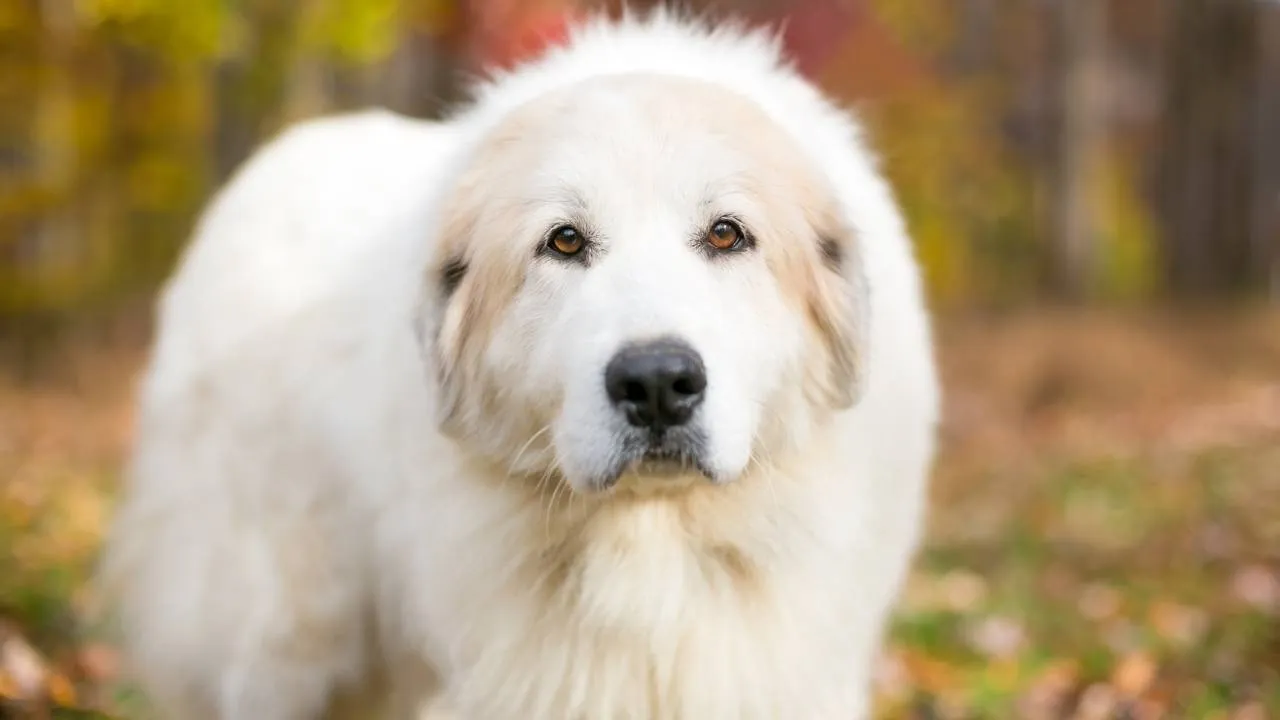
The Great Pyrenees has a long history as a livestock guardian in the mountain ranges between France and Spain. Bred to protect flocks from wolves and bears, these dogs combine strength with steady patience, making them both fearless protectors and gentle companions.
They are affectionate with their families and especially gentle with children, often earning the nickname “gentle giants.” Their loyalty and nurturing nature make them a good fit for households looking for both a guardian and a loving family member.
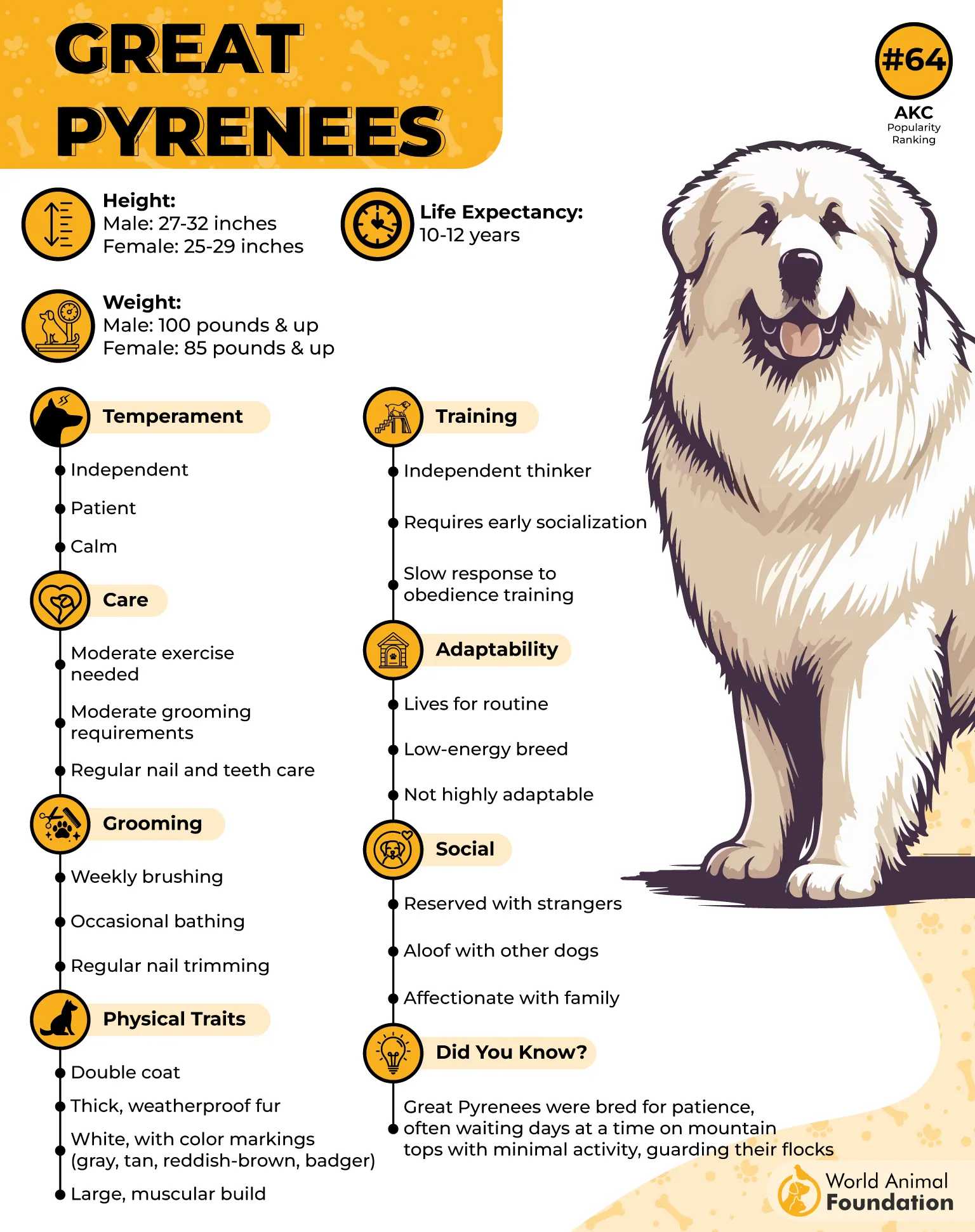
One of their defining traits is their tendency to bark at night. This behavior comes from centuries of guarding livestock under the stars, using their vigilance and booming voices to ward off threats. In a modern home, this trait can be managed but should not be expected.
As guardians, they are independent thinkers. They excel when allowed to make decisions in protecting their territory, but this independence can sometimes make them appear stubborn. Training should be calm and respectful, focusing on cooperation rather than strict obedience.
Their thick double coat allows them to thrive in cold climates, while still offering some protection in summer. Regular grooming helps manage shedding and keeps them comfortable. Combined with their calm personality, these dogs are as majestic as they are practical.
Quick Tips
Ensure a secure, high fence to contain their strong roaming instincts.
Use patient, positive training methods that respect their independent nature.
7. Giant Schnauzer
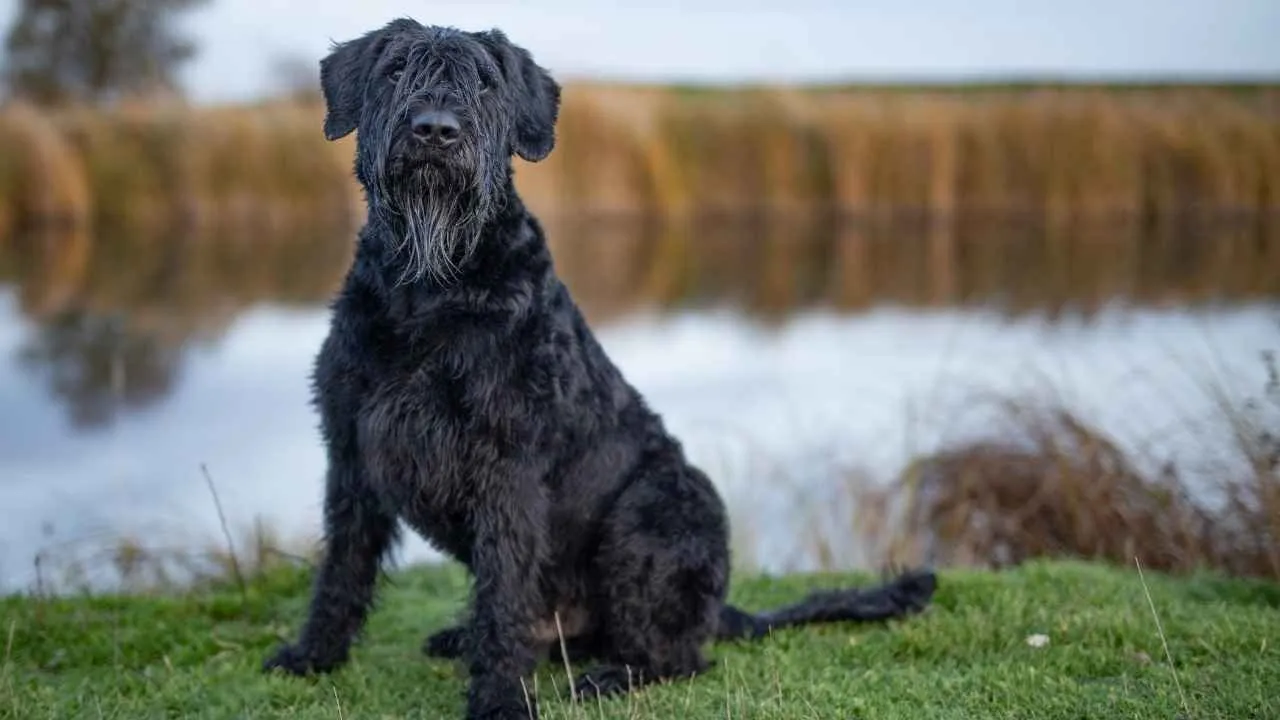
The Giant Schnauzer was originally bred in Germany to drive cattle and guard property. Their imposing size, keen intelligence, and natural suspicion of strangers made them excellent working dogs, and today those same qualities make them effective protectors for families.
Highly energetic, Giants thrive on activity and purpose. They need regular exercise, mental challenges, and structured training to stay balanced. Without these outlets, their intelligence and energy can quickly turn into mischief or frustration.
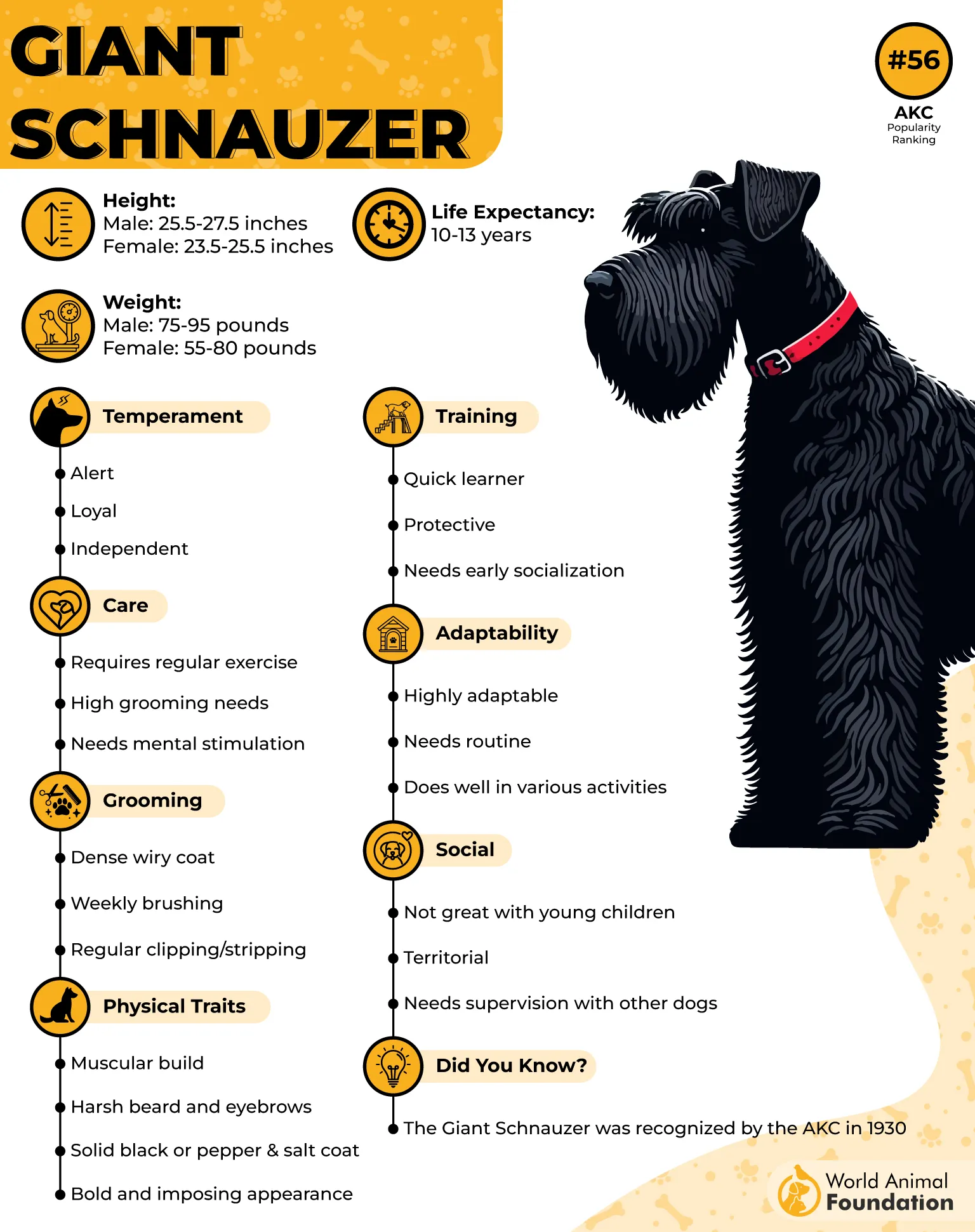
Loyalty is at the heart of this breed. Giant Schnauzers form strong attachments to their families and are known for being affectionate and dependable companions. Their devotion makes them both reliable guardians and engaging pets when included in daily life.
As watchdogs, they are naturally alert and highly protective. They are quick to sense unusual activity, making them excellent deterrents to potential threats. Early socialization ensures they can distinguish between friendly visitors and genuine danger.
With their distinctive bearded appearance and bold character, Giant Schnauzers also stand out as a breed full of personality. Their combination of confidence, intelligence, and protective instinct makes them a favorite among families looking for both companionship and security.
Quick Tips
Commit to daily exercise and mental enrichment to keep them engaged.
Begin consistent training and socialization early to channel their protective instincts.
8. Staffordshire Bull Terrier
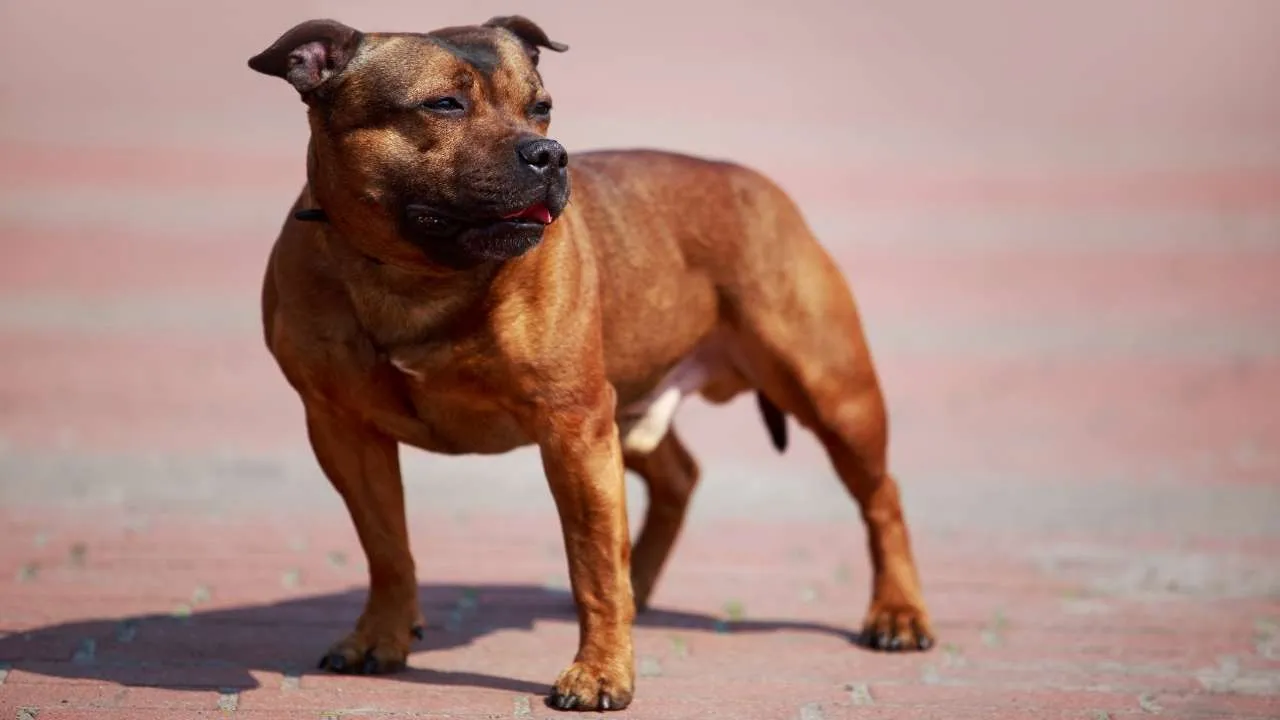
Staffordshire Bull Terriers are strong, compact dogs originally bred for bull-baiting, but today they’re best known as loyal, affectionate companions. They are especially cherished for their gentleness with children, earning them the nickname “nanny dogs.”
Though small in stature compared to other guard breeds, they are courageous and protective when needed. Their confidence and muscular build make them both sturdy playmates and reliable family guardians.
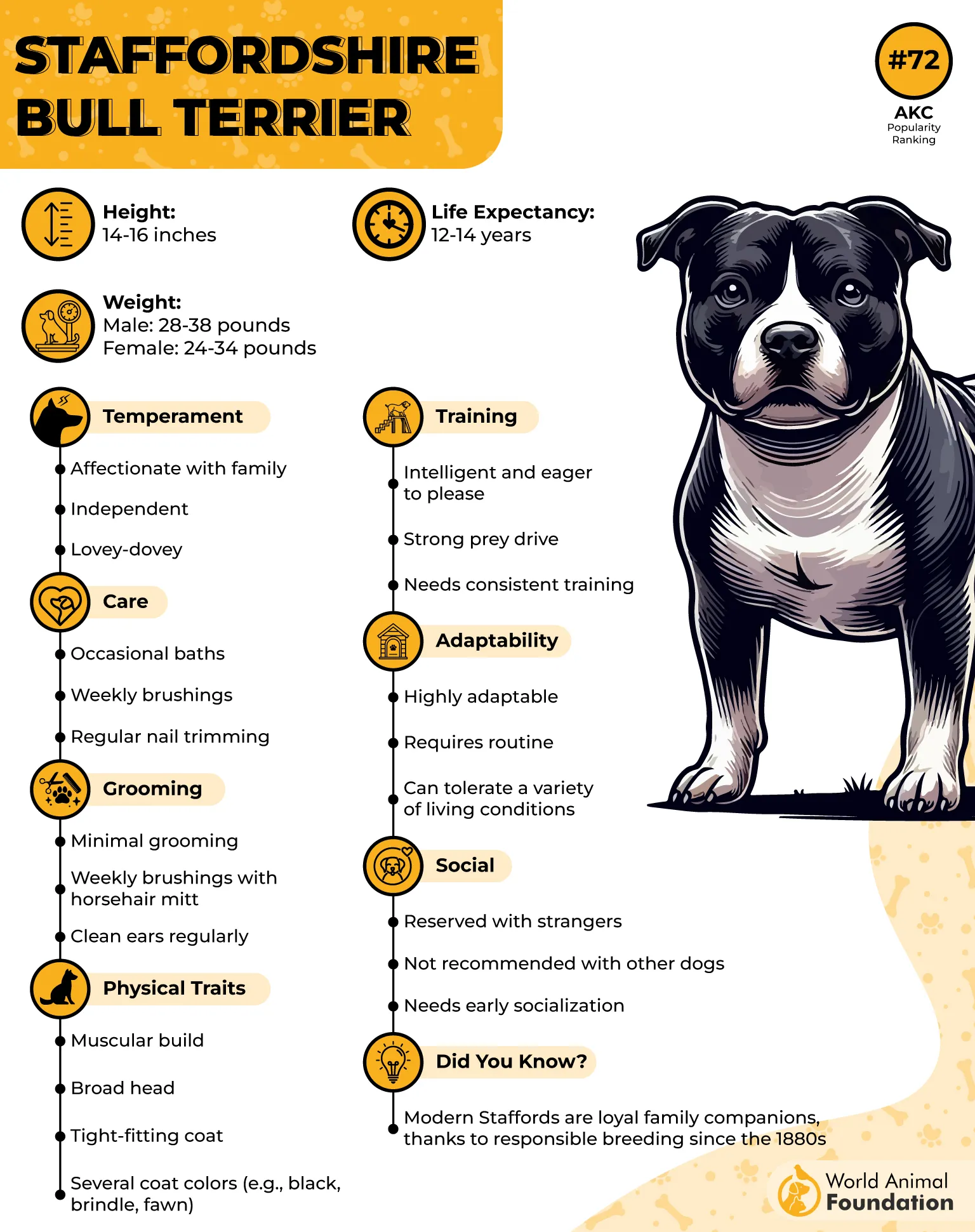
Staffies form deep emotional bonds with their families and thrive on companionship. They dislike being left alone for long periods and are happiest when included in daily life and activities.
Naturally energetic, they need regular physical exercise and mental stimulation. Without it, their intelligence and drive can lead to destructive behaviors, so interactive play and training are essential.
While affectionate with people, they may show strong prey drive toward other animals. Early socialization and consistent training help ensure they remain well-mannered, balanced dogs.
Quick Tips
Engage them daily with exercise and play to keep their energy in check.
Prioritize early socialization to ensure calm, confident interactions with people and pets.
9. Great Dane
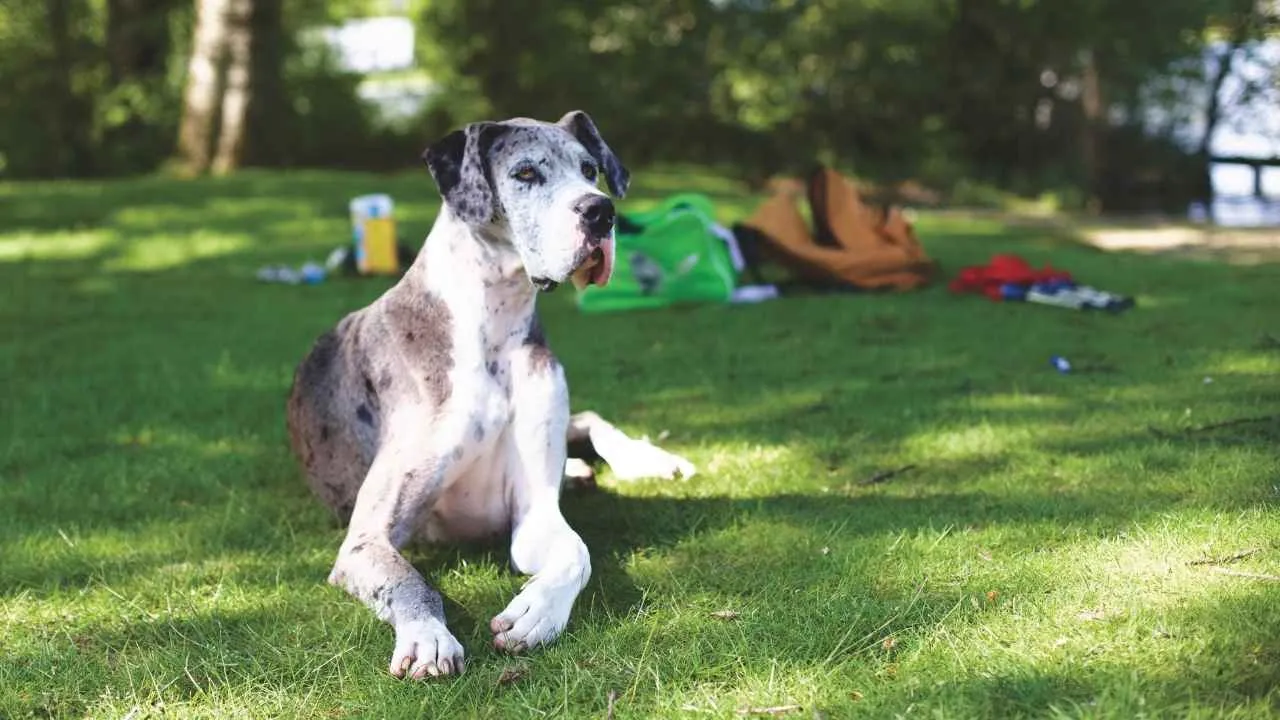
The Great Dane is one of the tallest dog breeds in the world, often towering over other dogs and even some people. Despite their size, they are gentle and even-tempered, often called “gentle giants.”
Their sheer presence and booming bark alone can deter strangers, even though they are not naturally aggressive. With proper training, they can serve as effective watchdogs while remaining calm and affectionate with family.
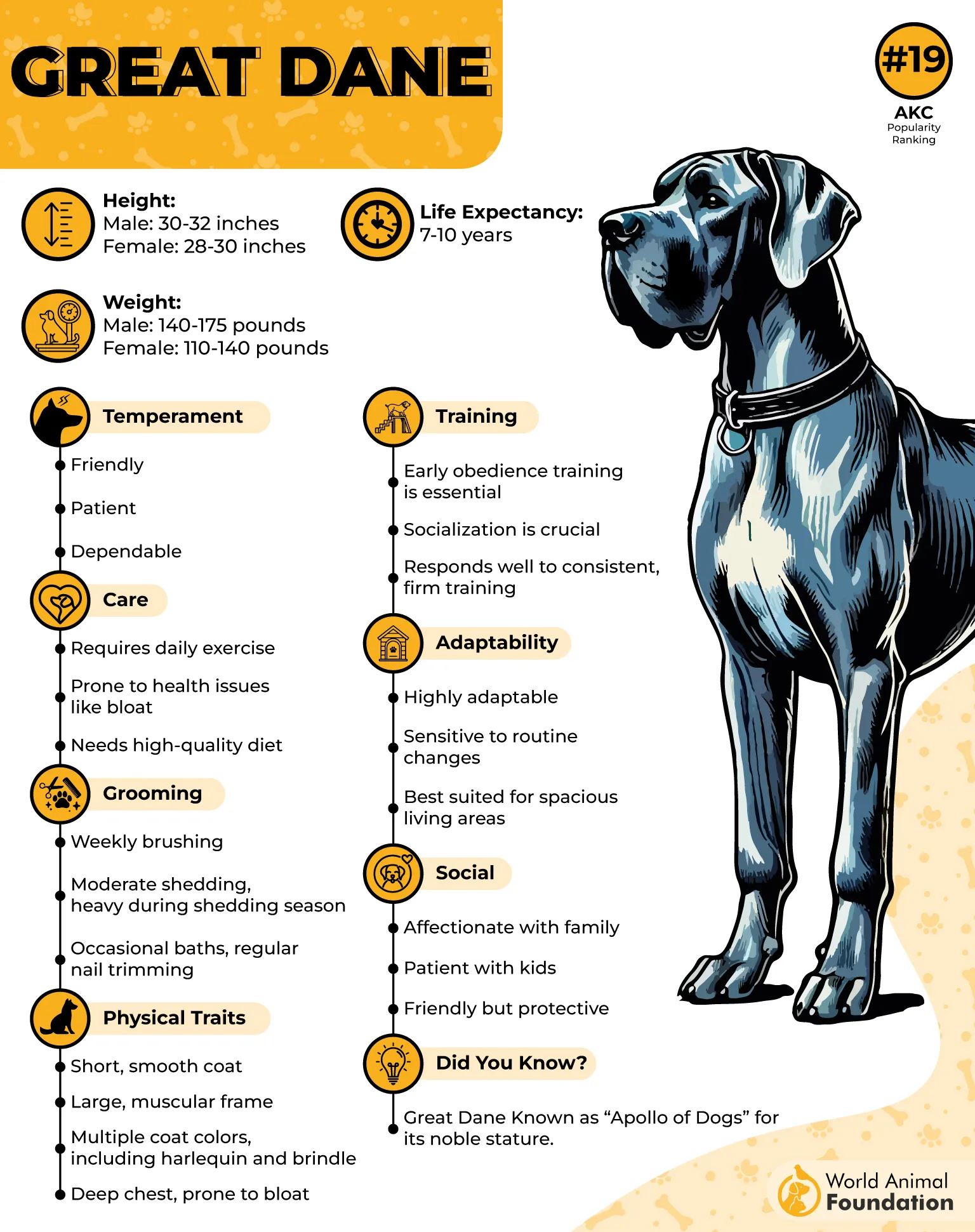
Great Danes are loyal and affectionate, thriving on human companionship. They bond closely with their families and enjoy being part of the household, making them both protectors and loving companions.
Their size requires careful handling, especially around small children. Early training is essential to prevent them from accidentally overwhelming people with their enthusiasm.
Although not traditionally bred as guard dogs, their loyalty, vigilance, and imposing figure give them the ability to provide security and comfort in a family setting.
Quick Tips
Begin training early to manage their large size and teach safe interactions.
Build on their natural watchfulness with consistent socialization.
10. Rhodesian Ridgeback
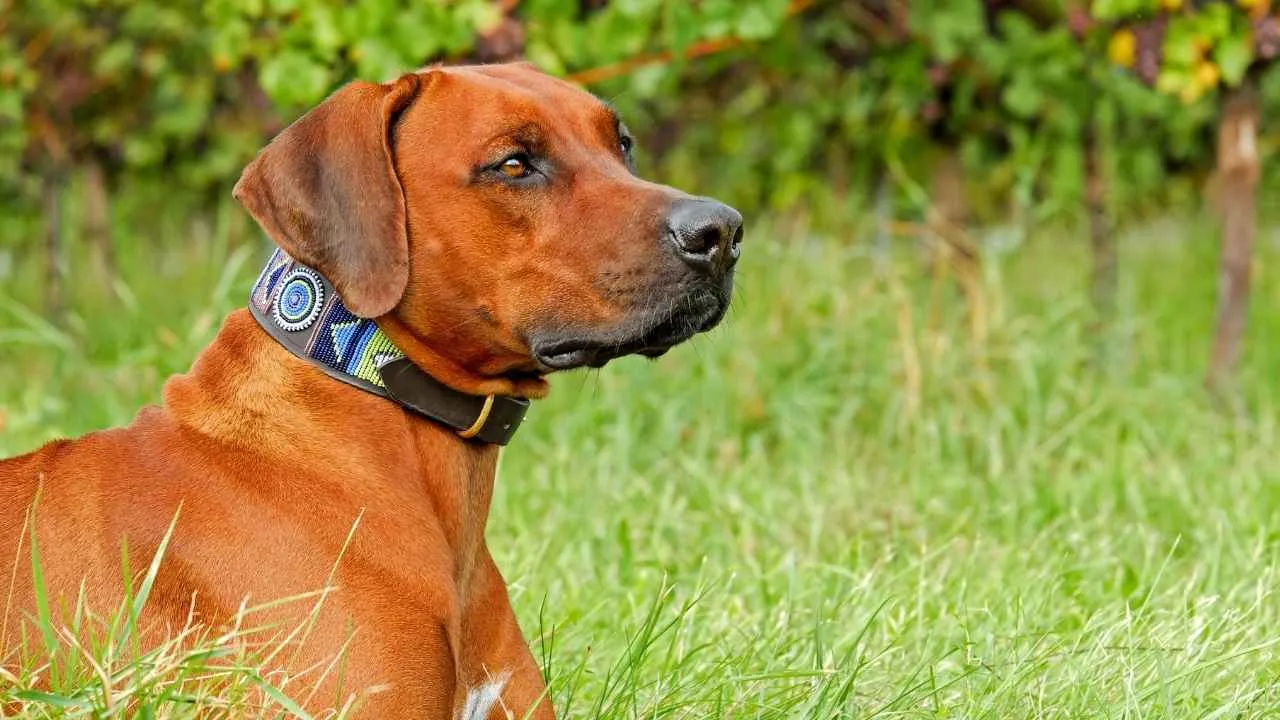
The Rhodesian Ridgeback is instantly recognizable for the distinctive ridge of hair along its back. Originally bred in Africa to track and hold lions, this breed is fearless yet even-tempered.
Their independence and confidence make them excellent guardians. They are protective of their families without being unnecessarily aggressive, showing courage when it matters most.
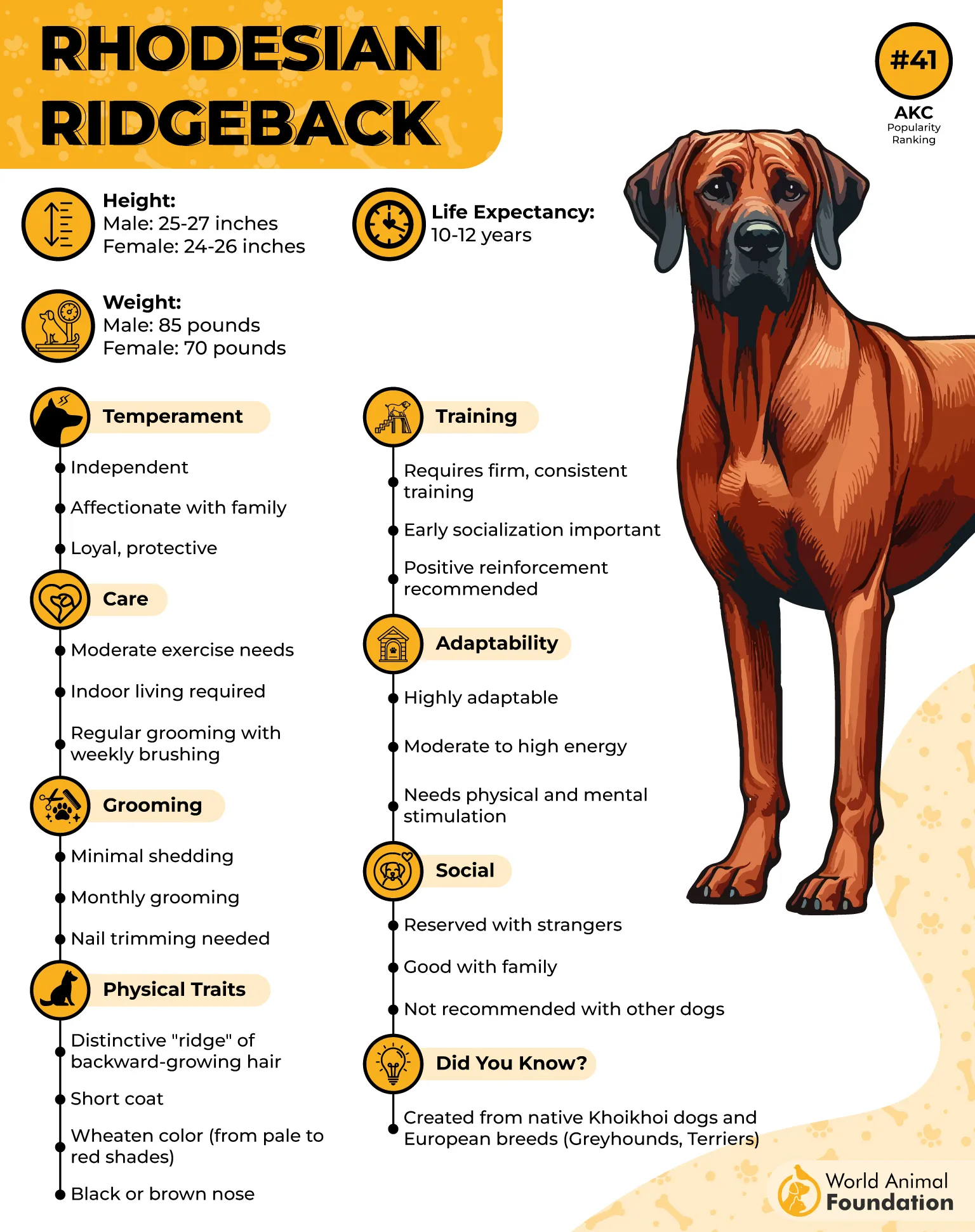
Despite their strong instincts, Ridgebacks are affectionate and loyal to their families. They enjoy companionship and form close bonds, especially when included in family activities.
Athletic and powerful, they thrive with regular exercise and enjoy activities such as running or hiking. Their endurance and agility make them well-suited for active households.
With early training and socialization, Rhodesian Ridgebacks become dignified, dependable family dogs that embody both nobility and strength.
Quick Tips
Provide plenty of physical activity to match their athletic heritage.
Use consistent, gentle training to channel their independence and bravery.
Conclusion
When choosing the best guard dogs, it’s important to remember that protection and companionship go hand in hand. These breeds are cautious around strangers, show great attacking qualities when necessary, and carry a loud bark that can deter even a full-grown man.
Other breeds like the Bernese Mountain Dog or the Saint Bernard may not always be thought of as excellent guard dogs, but with proper obedience training, they can grow into loyal family pets that are both protective and loving.
Because such large breeds require lots of exercise, daily walks, and lots of positive reinforcement, obedience training is essential. Raise this dog from a puppy alongside your kids and family, and they will become accustomed to your home, follow strict orders, and get along with others.
While they may accidentally knock down small children, with rules, attention, and consistency, they make a great, loving addition to any home, making them excellent guard dogs without losing their gentle, family-friendly side.


